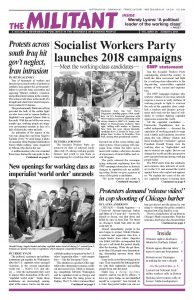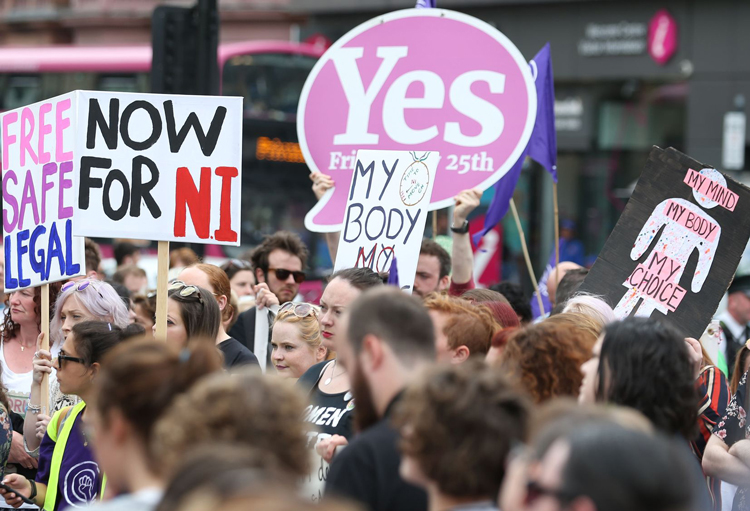BELFAST, Northern Ireland — “What do we want? The right to choose! When do we want it? Now!” chanted hundreds demonstrating outside City Hall here July 7.
The youthful rally, organized by Alliance for Choice and Rally for Choice, was called to respond to an anti-abortion-rights “All-Ireland Rally for Life,” held at the same time at Stormont, the seat of the Northern Ireland Assembly.
The rival rallies are part of a growing struggle over a woman’s right to choose whether to have an abortion. On May 25 a decisive majority voted by referendum in the Republic of Ireland to repeal the Eighth Amendment to the constitution, which effectively prevented women’s access to abortion.
Posed now is whether women’s right to choose abortion, banned in Northern Ireland, will be legalized. According to The Times, the number of women traveling to other parts of the U.K. to obtain a termination rose from 624 in 2016 to 919 last year. Since June 2017 the U.K. government has covered the cost of abortions, though not travel costs.
“No more airfare, we want health care,” protesters chanted. Many signs showed an “airfare” ticket with a red cross over it.
Communist League members traveled from London and Manchester to join in the rally and discuss this issue with workers in Belfast. We knocked on doors in two working-class areas of the city — New Lodge Road and Falls Road — to tell people about the rally. We found great openness to discuss the question of a woman’s right to choose and what should be done next.
While some said they were opposed to abortion and didn’t want to discuss it, a number said, “I’m pro-choice.”. “My girlfriend and I are very pro-choice,” Francis Conlon, a young chef, told us. “It doesn’t make sense that people are going across the water for a procedure that could be done here,” he said. “This corner of the U.K. — or of Ireland, whichever way you put it — has to be more forward-thinking.”
Conlon described how he had opposed groups that used to harass women coming in or out of the Belfast Mary Stopes clinic. For five years it provided advice for women, including on how to travel to England and pay for abortions there. The clinic closed in December 2017 after the government decided to grant abortions free of charge to women who came from Northern Ireland.
One woman, who didn’t want her name used, said she was part of a group of midwives and midwifery students going to the pro-choice rally. After a discussion on the worldwide fight for women’s rights and working-class resistance against attacks from the bosses today, she got a subscription to the Militant.
Some were still thinking about it. “As a Catholic, I’m opposed to abortion,” said Catherine McWilliams, who works in a care home, “unless there is something seriously wrong.” We raised that the right to choose abortion was a matter of women’s rights, and that it was part of advancing the unity and self-confidence of the working class.
“Yes, women have gained a lot more equality,” McWilliams responded. “It used to be, if you got married, you would stay in the home, but now you say, ‘it’s my job, I decide if I keep it.’”
Mairtín Lavery, a self-employed car mechanic, had a similar response. “A new life is something precious, so I wouldn’t be for women having abortions too easily,” he said. “But if it was rape, or the child would have no sort of life, that’s different.”
When we raised that this was a matter for women themselves to decide, not the capitalist state, Lavery liked our working-class approach. “You think like people around here,” he said.


